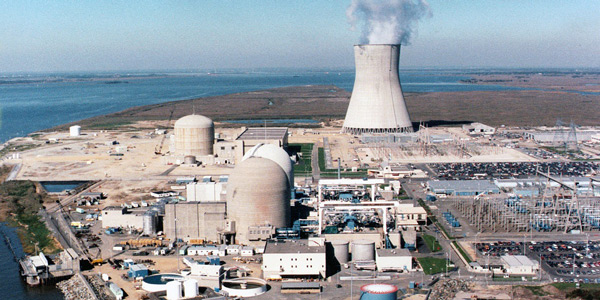By Rory D. Sweeney
Public Service Enterprise Group and Exelon would receive hundreds of millions in subsidies to maintain the profitability of three in-state nuclear plants under legislation introduced in the New Jersey Senate on Friday (S3560).
Two of the sponsors, Sens. Stephen Sweeney and Jeff Van Drew, represent the area of southern New Jersey where the units are located. The third, Sen. Bob Smith, is chair of the Senate Environment and Energy Committee. PSEG has three nuclear reactors between the Salem and Hope Creek facilities; Exelon owns 43% of the Salem units.
Under the bill, the plants could be compensated through the issue of “nuclear diversity certificates” (NDCs) representing the “environmental and fuel diversity attributes” of 1 MWh produced by an eligible nuclear unit. All utilities in the state would be required to purchase NDCs from the nuclear plants monthly.
Funding for the program would come from a 0.4-cent/kWh charge on all New Jersey retail customers’ bills. The state Board of Public Utilities would have discretion to reduce the charge as it deems appropriate.
Several groups, including PJM’s Independent Market Monitor, New Jersey’s Division of Rate Counsel and coalitions of in-state citizen advocates and non-nuclear power generators oppose the plan and have pointed out that PSEG’s plants remain profitable. (See Opponents Assemble as PSEG Seeks NJ Nuke Subsidy.)
The three nuclear units provide about 40% of the state’s power. PSEG has estimated the subsidies could cost $240 million a year, about $31 for an average residential ratepayer. The Division of Rate Counsel put the cost at $320 million, or $41 per customer.
Eligibility Process
Plants would become eligible for NDCs by providing, within 30 days of the law’s enactment, certified three-year forward-looking cost projections that include operations and maintenance, fuel, non-fuel capital, and a valuation of operational and market risks that would be avoided if the plant shut down. The plants also could provide “any other information, financial or otherwise, to demonstrate that the nuclear power plant’s fuel diversity and air quality attributes are at risk of loss because the nuclear power plant is cash negative on an annual basis, or alternatively is not covering its costs including its cost of capital on an annual basis.”
Exelon and PSEG would also have to provide “certification that the nuclear power plant will cease operations within three years unless the nuclear power plant experiences a material financial change, and the certification shall specify the necessary steps required to be completed to cease the nuclear power plant’s operations.”
All information could be supplied confidentially.
The BPU would then have another three months to develop an application process for the plants to receive payment for their NDCs, and the plants would have another month to apply. A plant would have to satisfy five inquiries concerning why it deserves to be in the program and pay an undetermined application fee that could reach $250,000.
Justification
The bill references New Jersey’s plan to secure 70% of its energy needs from “clean energy sources by 2050,” calling nuclear a “critical source of zero-emissions energy.”
If the plants close, the void will be filled with natural gas plants, the bill says, and that “capacity challenges on existing natural gas pipelines combined with the difficulty in siting and constructing new natural gas pipelines, along with competing uses for natural gas, such as building heating, have created supply constraints in the past, and those constraints could impact system reliability.”
Part of the bill’s justification is that “recent severe weather events have demonstrated the need to improve the resilience of the electric power delivery system” and that “the mix of generation resources serving New Jersey residents must be capable of handling high-impact, low probability weather events.”
However, selected plants could be excused from performance in the event of natural disasters or other catastrophic events, such as labor disputes, or if the plant would need more than $40 million in capital expenditures. Plants that stop operating for a reason that isn’t covered would need to pay back all the payments it received since its last eligibility determination.
“Gov. [Chris] Christie is attempting one last robbery of the people and environment of New Jersey before he leaves office in January,” Jeff Tittel, director of the New Jersey Sierra Club, wrote in an op-ed about the bill Monday.
“The bill would give PSEG subsidies for their nuclear plants in New Jersey and simultaneously tie Governor-elect [Phil] Murphy’s hands when it comes to promoting renewable energy. Cheap natural gas combined with nuclear subsidies means renewable energy gets pushed out. Christie is trying to dictate New Jersey’s energy policy for the next 40 years, despite the fact that the people want renewable energy, and this bill undermines that.”




